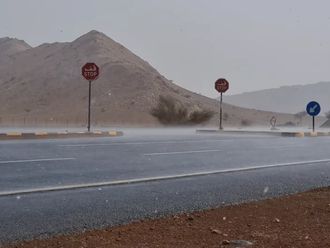Abu Dhabi: The number of Bangladeshi illegal workers seeking amnesty under the current scheme is expected to reduce by 50 per cent thanks to welfare measures taken by the UAE Government, a Bangladeshi diplomat told Gulf News yesterday.
A system of salary payment to the workers through the bank and money exchanges, plus new labour accommodations in Abu Dhabi, have helped reduce the number of illegal workers considerably, said Mohammad Nazmul Quanine, Bangladeshi Ambassador to the UAE.
Quanine said although more than 40,000 illegal Bangladeshi workers took advantage of the previous amnesty in 2007, the embassy estimated that it would only be around 20,000 under the current scheme.
The Bangladeshi Embassy in Abu Dhabi and the Consulate in Dubai have issued more than 6,000 emergency certificates (or out-passes) to those who do not have passports, Quanine said. Most of them were issued in Dubai, where 400 to 500 people turn up a day, while about 100-150 people approach the embassy in Abu Dhabi on a daily basis, the ambassador added.
“The indications so far suggest that the number of illegal Bangladeshis has gone down considerably,” he said, adding that the Wage Protection System (WPS), introduced by the Ministry of Labour, has been ensuring that all workers get their monthly salary in time. “That has reduced the number of unpaid workers absconding from their regular job and doing odd jobs by illegally staying in the UAE.”
WPS was introduced in May 2009 to safeguard payment of workers’ wages via transfers through selected financial institutions such as banks and money exchange centres, which are authorised and regulated by the government. Any company that delays the payment of a worker’s wages for 60 days will now face fines up to Dh5,000 per worker and in cases where multiple workers have not been paid, the maximum fine that can be imposed on a company is Dh50,000. There is a Dh20,000 fine per case when incorrect information is entered into the WPS.
The ambassador said new labour cities constructed by the government on the outskirts of Abu Dhabi also helped reducing illegal workers. “This has considerably reduced the number of Bangladeshi illegals in Abu Dhabi emirate,” Quanine said. “Before, some workers would abscond from work due to inadequate housing facilities.”
He said similar accommodation facilities across the UAE had also helped reduce the number of labour disputes and illegal workers.
The Bangladeshi missions in the UAE and Bangladeshi government blacklisted about 15 unscrupulous recruitment agencies in recent years and such stringent action had also contributed to the positive trend, Quanine added.
Figures
40,000 Bangladeshis availed of amnesty in 2007
20,000 Bangladeshis expected to avail of current amnesty
6,000 out-passes issues by Bangladeshi missions
400-500 applicants in Dubai daily
100-150 applicants in Abu Dhabi daily
15 recruitment agencies blacklisted by Bangladesh












